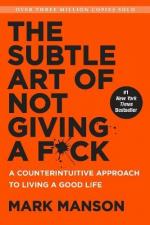|
This section contains 1,013 words (approx. 3 pages at 400 words per page) |

|
Summary
Mark Manson opens his book with a story about the poet Charles Bukowski. Bukowski was "an alcoholic, a womanizer, a chronic gambler, a lout, a cheapskate, [and] a deadbeat" who also suffered from depression (1). Bukowski failed for decades before "making it" as a writer and is often touted as an example of the American Dream. However, Manson believes that Bukowski's real success is in his comfort with failure. Manson uses Bukowski to illustrate our culture's flawed obsession with "realistically positive expectations" (3). Manson argues that conventional self-help advice makes people focus on what they lack, therefore fixating on "positive" yet-to-be-attained happiness goals. That makes us dissatisfied with what we do have and unable to appreciate the happiness we've already created. Manson argues against "chasing a mirage of happiness and satisfaction" and that the "key to a good life is not giving a fuck about more...
(read more from the Chapter 1 Summary)
|
This section contains 1,013 words (approx. 3 pages at 400 words per page) |

|




